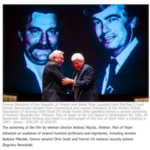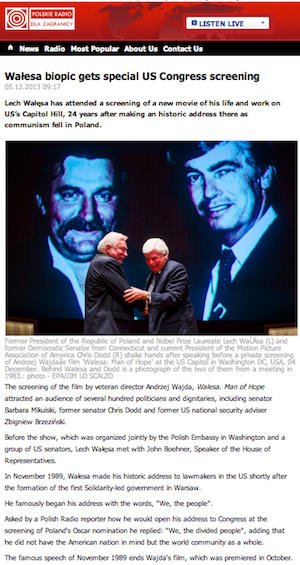BBG Watch Commentary

When Lech Wałęsa was leading the Solidarity trade union in the 1980s, the Voice of America Polish Service was listened to by more than 70 percent of Poles, making it one of the most popular programs in VOA’s history. Wałęsa later said that his and Solidarity’s victory in 1989 would not have been possible without the contribution of uncensored news reporting by the Voice of America and Radio Free Europe. When he delivered his historic speech to the joint session of the U.S. Congress 24 years ago, as communism fell in Poland, the speech was broadcast to Poland jointly by the Voice of America and the newly-reformed Polish Radio.
But when Solidarity leader, Nobel Peace Prize laureate and former President of Poland returned to the U.S. Congress Wednesday for a special screening of a biographical movie about him, “Wałęsa: Man of Hope,” by Polish filmmaker Andrzej Wajda, the Voice of America ignored the event.
The Polish Radio, which reported on Wałęsa’s return to the U.S. Congress, included a photo by Jim Lo Scalzo of the European Pressphoto Agency showing former President of Poland shaking hands with former Democratic Senator from Connecticut and current President of the Motion Picture Association of America Chris Dodd shortly before the film screening on Capitol Hill. Behind Wałęsa and Dodd was a photograph of the two of them from a meeting in 1983.
The Polish Radio report said that the film attracted an audience of several hundred U.S. politicians and dignitaries, including senator Barbara Mikulski and former US national security adviser Zbigniew Brzeziński.
Before the show, which was organized jointly by the Polish Embassy in Washington and a group of U.S. senators, Lech Wałęsa met with John Boehner, Speaker of the House of Representatives, the report said.
When Wałęsa spoke to the joint session of Congress in 1989, he famously began his address with the words, “We, the people”. Asked by a Polish Radio reporter how he would open his address to Congress at the screening of Poland’s Oscar nomination he replied: “We, the divided people”, adding that he did not have the American nation in mind but the world community as a whole.
See more: “Wałesa biopic gets special US Congress screening,” Polish Radio, December 5, 2013.
While the Voice of America, which is in the midst of a management crisis, ignored the Capitol Hill event with Lech Wałęsa and many other similar human rights news stories in recent days and months, the Office of Cuba Broadcasting (OCB), which runs Radio and TV Marti and like VOA is also funded through the Broadcasting Board of Governors (BBG), broadcast recently an interview with Wałęsa in which he examined the opposition movement in Cuba and the work yet to be done by civil society to bring about a democratic change.
See more: “TV Martí Airs Hacia La Democracia II“, Featuring Lech Walesa, BBG, November 11, 2013.
Radio Free Europe/Radio Liberty (RFE/RL), which also reports to the BBG, recently posted a special program about Wałesa.
See more: “At 70, Lech Walesa Can Look Back On An Enduring Legacy,” RFE/RL, September 28, 2013.
But a visit by Lech Wałęsa to Washington, DC and his appearance on Capitol Hill, just a few blocks away from the Voice of America headquarters, was clearly a story for VOA to report on for worldwide audiences.
It is not that VOA focuses only on major political events — which, by the way, VOA also often misses or is late in reporting on them — and has no time for anything else.
Under its current leadership, VOA found time and resources to post not one but five separate news reports on the recent royal christening in Great Britain and had a report on finishing schools in Switzerland.
Obviously, an event in the U.S. Congress, which pays VOA’s bills, and a visit to Washington by a famous human rights and political leader who had helped to made Voice of America broadcasts highly popular in the 1980s was not important enough for VOA executives.
Lech Wałęsa: “Of course, what I’m about to say is well known.
It is hard to imagine – when the communist system was still in existence, when we had been betrayed but did not give up the fight — if there were would have been no other media that could encourage, may be not encourage, but to show, to provide the proof, to speak the truth, to speak about what was happening here and elsewhere — something we could not see for ourselves, being cut off from the real information, and fighting within our limited capabilities.
Therefore, it is difficult to imagine what would have happened if it were not for the Voice of America and other sources with the help of which the true information squeezed through, which showed a different point of view, which said that we are not alone and that something is happening in the country — because our mass media did not do that.
Therefore, I will say it briefly — we would not have what we have without the segment of propaganda, which was found in the Voice of America. It is not conceivable that it would have happened so quickly and so effectively if not for the Voice of America.
Even as a child I remember how my parents surreptitiously listened to the free word of the Voice of America and Radio Free Europe, and others.I also listened. I listened when they were listening.
And because of that, opposition was awaken, and the information and the real image of what was taking place here and in the free world.And so, the great glory to the Voice of America and other media that had enabled us to survive, [gave us] the real information, [ability] to compare information, and so on, and so forth.”
Maria Bnińska: What does the 50th anniversary of the Voice of America mean for you?
Lech Wałęsa: I think, it is the present victory; its role in this victory.
At the same time, it is contribution to general knowledge, my own and for generations that lived through this period.
Many did not see the effects of their work.
We must remember many, in history and in everything else; they have made a great contribution.
This is, I think, for today the great contribution of the Voice of America.
